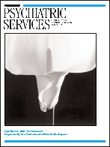Disasters in the 21st Century: Lessons From Project Liberty
The reports from Project Liberty in this special issue of Psychiatric Services attest to the wealth of experience and the explosion of knowledge and understanding gained in work associated with the September 11, 2001, terrorist attacks five years ago. More than $137 million was spent on Project Liberty to serve approximately 1.5 million people, making it the largest federal disaster mental health program in history. Additional attention and resources were focused on the response at the Pentagon and in Shanksville, Pennsylvania. Noteworthy is the maturation of federal mental health services in recognizing the needs of affected populations by offering enhanced services and an intervention for complicated grief and in enhancing accountability by assessing the delivery and impact of services.
Historically, federally funded crisis counseling programs have not supported traditional treatment, focusing instead on the needs of persons whose reactions do not reach the level of psychopathology. Those needing traditional psychiatric care are referred to providers in the existing mental health system. After a disaster, the potential for serious and enduring pathology is great, and the costs of providing traditional care may be substantial. Some of the Project Liberty articles report information about the approximately 10 percent of counseling recipients who were referred to professional mental health services. More systematic information is needed, however, to understand the care provided to these individuals.
Disaster mental health care has evolved, and its growth is reflected in the ability to respond to succeeding disasters of increased dimensions in the context of more complex and devastated environments. Research is likewise advancing. Gone is the concern voiced after the 1995 Oklahoma City bombing that conducting evaluation and services research was somehow antithetical to providing high-quality care. The articles in this issue of Psychiatric Services demonstrate how a partnership of providers, administrators, and researchers using relatively simple quality assurance approaches can greatly enhance what we know about the disaster mental health services that are provided.
Incorporating such quality assurance approaches in future disaster responses is an important step in continuing the process of improving services while enriching the evidence base about the best approaches. It is also vital that journals like Psychiatric Services spotlight the successes and failures of the disaster mental health system so that the larger professional audience and policy makers can make informed choices about needs and priorities.



